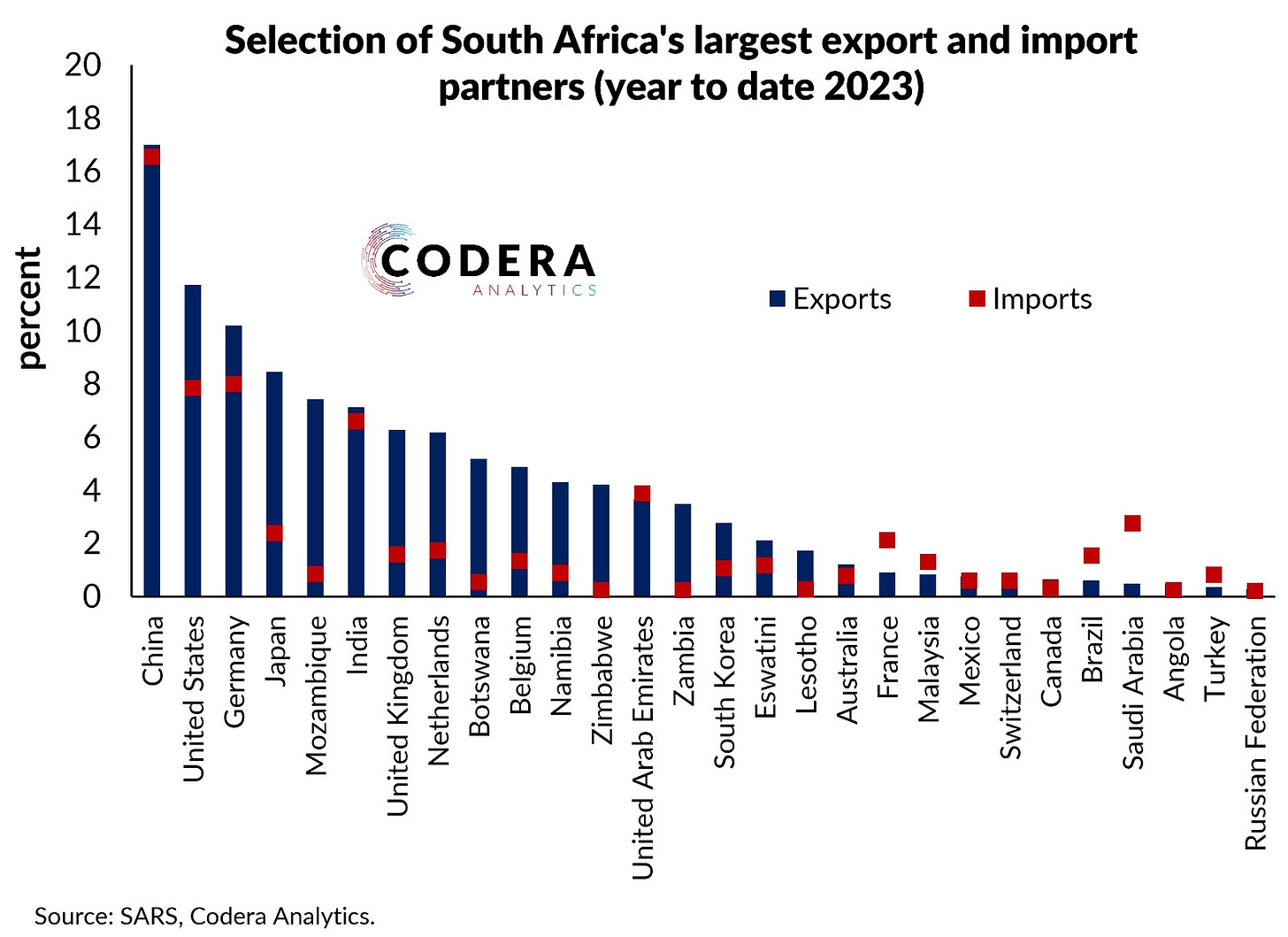Ramaphosa's incompetent statecraft
Why the anti-western and pro-Russian posturing?
With the recent BRICS conference, President Ramaphosa referred to Vladimir Putin as "our valued ally." While I have defended, and still do defend, South Africa’s non-aligned stance regarding the war in Ukraine, because of the obvious contribution of NATO expansion to the conflict, it appears that Ramaphosa is interpreting non-alignment as being "pro-Russian”. By implication, this suggests that BRICS is by definition "anti-Western."
This position might reflect the ideological leanings of certain senior ANC members, who are always eager to make anti-Western statements without recognizing South Africa’s dependence on Western trade. I can’t help but wonder how Ramaphosa internalizes such rhetoric. A simple glance at South Africa’s foreign trade reveals an undeniable fact: that our trade with Russia is smaller than our trade with Angola.
There is no substantial exchange of goods and services between South Africa and Russia, a country that is, in effect, landlocked and literally situated on the other side of the world. What exactly is there in this relationship that deserves so much value?
South Africa’s most promising students don’t go to Russia to study science or technology, they rather go to Western countries such as Britain, Australia, France, America and the USA. Unlike India, South Africa lacks a significant diaspora with cultural ties to Russia, and unlike China, one can’t justify the realism on the grounds that our economy is reliant on Russian trade. Nor is there a shared energy infrastructure, as exists between Hungary and Germany, or significant linguistic ties, as seen among the former USSR countries.
Given that several ANC leaders were trained in the former USSR, it's understandable that there are emotional historical ties, but this is irrelevant. It overlooks the fact that Russia is no longer the Soviet Union as several Russian experts such as Prof. Steven Cohen have written about. Russia has notably implemented several reforms to distance the country from its Soviet past. A striking fact is that the works of Aleksandr Solzhenitsyn’s Gulag is mandatory reading in Russian schools and that Russia is no longer a planned economy, it rather resembles America’s corporate oligarchy.
Whatever emotional ties to the past may exist, in geopolitics they are often set aside, as a nation must balance its moral values with its strategic interests when choosing its international relations.
For South Africa’s President to take such a firm stance in favor of Putin is baffling. What will happen if the U.S., Germany, and Japan—our largest trading partners—decide to use their economic leverage against us? Is the ANC unaware of the long history of American interference in countries that chose to oppose it? Notably the several coup d’états that the USA have instigated in the Western Hemisphere against Venezuela, Argentina, Nicaragua and several others when they chose to defy the Monroe Doctrine? Are they willing to forgo the favorable terms of the AGOA trade agreement, that in effect makes the US taxpayer subsidize much of our trade?
One can understand the ANC’s stance on the Palestinian issue, given the comparable historical experience. But with the Ukraine War it is different. One can, for example, acknowledge that the West provoked the conflict and instigated the Maidan coup d'état that was rebranded as the “revolution of dignity”, but that doesn’t make Putin’s invasion morally defensible. And even if it did, how does that make him a 'valued ally'?
Similarly, one can appreciate the argument for non-alignment that Naledi Pandor put forward, as the Ukraine war is a complex, symmetrical conflict. However, this excessive pro-Russian policy, instead of maintaining a neutral stance in great power struggles, is at best political naïveté.
It reflects Ramaphosa's deeply incompetent statecraft and the ANC’s misunderstanding of the true meaning of strategic non-alignment.




Russia landlocked? Even with the "in effect" qualifier this is utter nonsense. It has extensive Baltic Sea, Black Sea and Pacific Ocean coastlines, plus an Arctic Ocean coastline that is slowly becoming more valuable
Hügo. Time you realised that BRICS and WEF Davos are no different except for the dress they wear depending on the occasion. Both WEF and BRICS are UN 2030 agenda enthusiasts.
see this. https://edwardslavsquat.substack.com/p/would-you-like-know-what-brics-just
If you look at the BRICS 2024 Kazan declaration, its obvious.